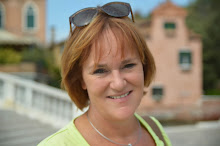You need:
- drawing sheet A2 size
- oilpastels
- liquid watercolor paint
- jar with water
- brushes
- salt
Color with oil pastels and draw patterns. Be sure the tentacles are going over and under each other - this has to be seen in the patterns. Outline when necessary with a dark color.
Drip some liquid water color on the background after you made it wet. Sprinkle salt for a great 'watery' effect.
All artworks are made by students of grade 3











.jpg)
.jpg)











.jpg)
.jpg)
.jpg)

.jpg)
.jpg)
.jpg)

.jpg)
.jpg)
.jpg)
